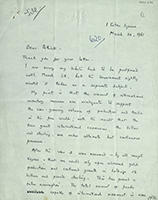Identificatie
referentie code
Titel
Datum(s)
- 20 Mar. 1961 (Vervaardig)
Beschrijvingsniveau
Omvang en medium
2 single sheets
Context
Naam van de archiefvormer
archiefbewaarplaats
Geschiedenis van het archief
Directe bron van verwerving of overbrenging
Inhoud en structuur
Bereik en inhoud
1 Eaton Square (London).—Explains why he considers the amount of international monetary reserves inadequate, and suggests remedies.
—————
Transcript
1 Eaton Square.
March 20, 1961.
Dear Pethick,
Thank you for your letter.
I am sorry my debate {1} had to be postponed until March 28, but the Government rightly wanted it taken as a separate subject.
My point is that the amount of international monetary reserves are inadequate to support the ever-growing volume of production and trade in the free world; with the result that the two great international currencies, the dollar and sterling, are under alternate but continuous pressure.
After the war it was assumed—by all except Keynes—that we could rely upon increased gold production and continued growth in holdings of dollars and pounds sterling. This has proved a false assumption. The total amount of funds capable of international movement is now very large indeed, compared to our reserves and IMF drawing rights. And it is this vulnerability that has caused us to adopt what has been described as the “Stop-and-go” policy of recent years, with disastrous effects upon our own economic growth and productivity.
The truth is that the price paid at Bretton Woods for fixed exchanges was supposed to be adequate international monetary reserves; and, owing to the rejection of Keynes’s scheme for the creation of international money in the form of “Bancor”, the necessary reserves were not in fact provided. The monetary system of the free world is therefore obsolete.
Various remedies have been propounded, and I shall touch on some of them.
A rise in the price of gold (now pegged at a wholly artificial level) is obviously one. But it would not be permanent; and I think that at present it is politically impossible.
It is, however, not insuperably difficult to devise means of creating more international liquidity and of converting present holdings of national reserve currencies—sterling and dollars—into holdings of reserves with international backing.
The culmination of a radical revision of the international monetary system should, in my view, be the transformation of the International Monetary Fund into an international central bank, the deposits of which would be an international currency on the lines of Keynes’s “Bancor”. This could be achieved in successive stages; but would ultimately require a revision of the Bretton Woods Charter. The main objective is a reorganisation of the international financial system designed to facilitate economic growth, and to remove the constant threat to balances of payment caused by the movement of “hot” money.
I therefore intend to ask for an international economic conference to consider the whole problem. And I am encouraged by the fact that the Radcliffe Committee saw “great merit in the proposal for a transformation of the I.M.F. into an international central bank”; and that President Kennedy said in his Inaugural Address, “We must now, in co-operation with other lending countries, begin to consider ways in which the international monetary institutions—especially the International Monetary Fund—can be strengthened and more effectively utilised, both in furnishing needed increases in reserves, and in providing the flexibility required to support a healthy and growing world economy”.
I do not know how many speakers there will be. But Derick Amory, Robbins and Bob Brand are certainties. Walter Monckton will be there. And I am hoping to persuade Cyril Radcliffe to do his duty!
It should be an interesting debate on a topic which, in my belief, is of major importance—perhaps the most important of all.
Yours ever,
Bob B.
—————
Letter-head of the House of Lords. At the head have been written ‘File.’ and ‘620’.
{1} A debate on ‘International Liquidity in the Free World’. See Parliamentary Debates (Hansard): House of Lords, vol. ccxxx, pp. 51–107.
Waardering, vernietiging en slectie
Aanvullingen
Ordeningstelsel
Voorwaarden voor toegang en gebruik
Voorwaarden voor raadpleging
Voorwaarden voor reproductie
Taal van het materiaal
Schrift van het materiaal
Taal en schrift aantekeningen
Fysieke eigenschappen en technische eisen
Toegangen
Verwante materialen
Bestaan en verblifplaats van originelen
Bestaan en verblijfplaats van kopieën
Related units of description
Aantekeningen
Alternative identifier(s)
Trefwoorden
Onderwerp trefwoord
Geografische trefwoorden
Naam ontsluitingsterm
- Boothby, Robert John Graham (1900-1986), Baron Boothby, politician (Onderwerp)
- Amory, Derick Heathcoat (1899-1981), 1st Viscount Amory, industrialist and politician (Onderwerp)
- Brand, Robert Henry (1878-1963), 1st Baron Brand, merchant banker and public servant (Onderwerp)
- Radcliffe, Cyril John (1899-1977), 1st Viscount Radcliffe, lawyer and public servant (Onderwerp)
- Keynes, John Maynard (1883-1946), 1st Baron Keynes, economist (Onderwerp)
- Robbins, Lionel Charles (1898-1984), Baron Robbins, economist (Onderwerp)
Genre access points
Identificatie van de beschrijving
Identificatiecode van de instelling
Toegepaste regels en/of conventies
Status
Niveau van detaillering
Verwijdering van datering archiefvorming
This description was created by A. C. Green in 2020.

